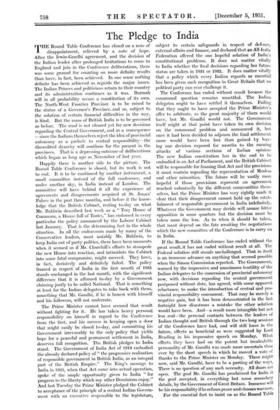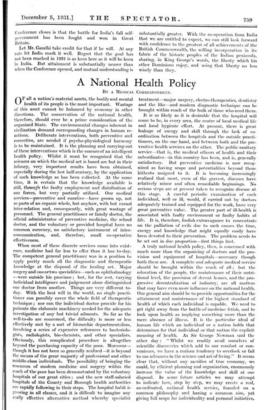The Pledge to India
THE Round Table Conference has closed on a note of disappointment, relieved by a note of hope. After the Irwin-Gandhi agreement, and the decision of the Indian leader after prolonged hesitations to come to England and join in the Conference deliberations, there was some ground for counting on more definite results than have, in fact, been achieved. In one sense nothing definite has been achieved as regards the major issues. The Indian Princes and politicians return to their country and its administration continues as it was. Burmah will in all probability secure a constitution of its own. The North-West Frontier Province is to be raised to the status of a Governor's Province, and so, subject to the solution of certain financial difficulties in the way, is Sind. But the mass of British India is to be governed as before. The road is not cleared yet for new decisions regarding the Central Government, and as a consequence —since the Indians themselves reject the idea of provincial. autonomy as a prelude to central responsibility—the discredited dyarchy will continue for the present in the provinces. That is a depressing outcome of deliberations which began as long ago as November of last year.
Happily there is another side to the picture. The Round Table Conference is closed, but its work is not to end. It is to be continued by another instrument, a small committee instead of the full conference, and under another sky, in India instead of London. The committee will have behind it all the experience of agreements and disagreements acquired at St. James' Palace in the past three months, and before it the know- ledge that the British Cabinet, resting to-day on what_ Mr. Baldwin described last week as a " Tory House of Commons, a House full of Tories," has endorsed in every particular the policy announced by the Labour Cabinet last January. That is the determining fact in the whole situation. In all the endeavours made by many of the Conservative leaders, most notably Mr. Baldwin, to keep India out of party politics, there have been moments when it seemed as if Mr. Churchill's efforts to stampede. the new House into reaction, and intimidate the Cabinet into some fatal compromise, might succeed. They have, in fact, decisively and definitely failed. The policy framed in respect of India in the first month of 1931 stands unchanged in the last month, with the significant difference that it is affirmed to-day by a Government claiming justly to be called National. That is something at least for the Indian delegates to take back with them,. something that Mr. Gandhi, if he is honest with himself and his followers, will not underrate.
The Prime Minister cannot have secured that result without fighting for it. He has taken heavy personal responsibility on himself in regard to the Conference from the first, and his success in keeping open a door that might easily be closed- to-day, and committing his Government irrevocably to the only policy that yields hope for a peaceful and permanent settlement in India, deserves full recognition. The British pledges to India stand. The Government of India Act of 1919 embodied the already declared policy of " the progressive realization of responsible government in British India, as an integral part of the British Empire." The King's message to India in 1921, when that Act came into actual operation, spoke of the ample opportunity given to India " for progress to the liberty which my other Dominions enjoy." And last Tuesday the Prime Minister pledged the Cabinet to acceptance of the principle of a central Indian Govern- ment with an executive responsible to the legislature, subject to certain safeguards in respect of defence, external affairs and finance, and declared that an All-India Federation offered the one hopeful solution of India's constitutional problems. It does not matter vitally to India whether the final decisions regarding her future status are taken in 1931 or 1932. It does matter vitally that a policy which every Indian regards as essential has been given such recognition in Great Britain that no political party can ever challenge it.
The Conference has ended without result because the communal question remains unsettled. The Indian delegates ought to have settled it themselves. Failing that they ought to have accepted the Prime Minister's offer to arbitrate, as the great majority of them would have, but Mr. Gandhi would not.. The Government itself might at that point have taken its own decision on the communal problem and announced it, but once it had been decided to adjourn the final settlement more would have been lost than gained by leav- ing one decision .exposed for months to the running attacks of various sections of Indian opinion. The new Indian constitution has in the end to be embodied in an Act of Parliament, and the British Cabinet will be responsible for framing that Act and the provisions it must contain regarding the representation of Moslem and other minorities. The future will be vastly more hopeful if those provisions represent an agreement reached voluntarily by the different communities them- selves, but the Prime Minister has very rightly made it clear that their disagreement cannot hold up the estab- lishment of responsible government in India indefinitely. Whatever the Government may decide will arouse bitter opposition in some quarters but the decision must be taken none the less. As to when it should be taken, that must depend on the .fate awaiting the negotiations which the new committee of the Conference is to carry on in India.
If the Round Table Conference has ended without the great result, it has not ended without result at all. The Federal solution still stands unchallenged. That in itself is an immense advance on anything that seemed possible when the Simon Commission reported. The Government, warned by the impressive and unanimous hostility .of the Indian delegates to the concession of provincial autonomy now, with decisions regarding the central government postponed without date, has agreed, with some apparent reluctance, to make the introduction of central and pro- vincial responsibility concurrent. That may be merely a negative gain, but it has been demonstrated in the last fortnight how disastrous a mistake the other solution would have been. And—a result more intangible but not less real—the personal contacts between the leaders of Indian thought and British through the two long sessions of the Conference have had, and will still have in the future, effects as beneficial as were suggested by Lord Reading in his impressive speech on Monday. What effects they have had on the potent but incalculable personality of Mr. Gandhi was made more uncertain than ever by the short speech in which he moved a vote of thanks to the Prime Minister on Monday. There might now, said Mr. Gandhi, have to be a parting of the ways. There is no question of any such necessity. All doors are open. The goal Mr. Gandhi has proclaimed for India is the goal: accepted, in everything but some secondary details, by the Government of Great Britain. Immense will be his responsibility if he refuses peace and chooses war now.
For the essential fact to insist on as the Round Table Conference closes is that the battle for India's full self- government has been fought and won in Great Britain.
Let Mr. Gandhi take credit for that if he will. At any rate let India mark it well. Regret that the goal has not been reached in 1931 is as keen here as it will be keen in India. But attainment is substantially nearer than when the Conference opened, and mutual understanding is substantially greater. With the co-operation from India that we are entitled to expect, we can still look forward with confidence to the greatest of all achievements of the British Commonwealth, the willing incorporation in its fabric of the historic peoples of the Indian peninsula, sharing, in King George's words, the liberty which his other Dominions enjoy, and using that liberty no less wisely than they.











































 Previous page
Previous page